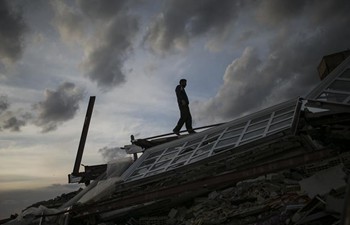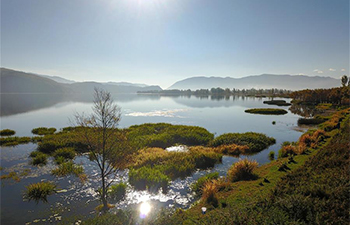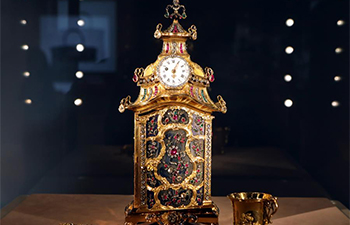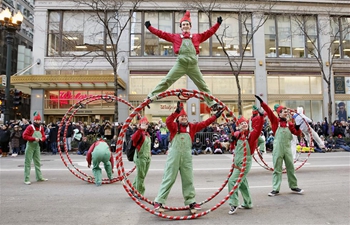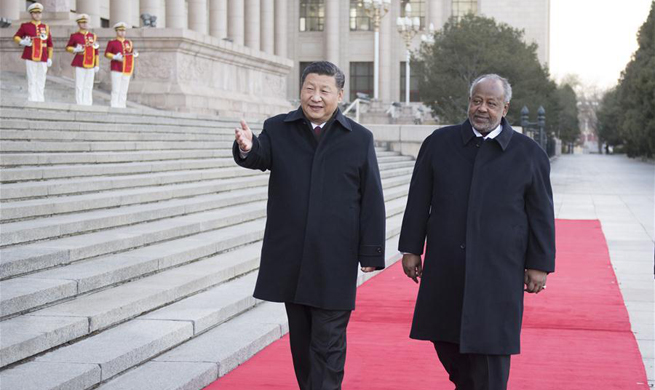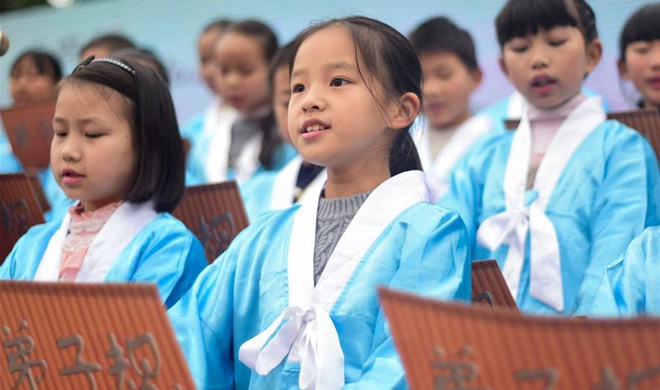by Christine Lagat
NAIROBI, Nov. 24 (Xinhua) -- Skeji Wine War is only 16 years old yet his ability to mimic globally acclaimed hip-hop artists has always mesmerized his peers at Kakuma refugee camp in northwest Kenya, which shelters thousands of displaced persons from strife-torn neighboring countries.
Skeji and his parents have lived at Kakuma refugee camp in the last four years after fleeing turmoil in their native South Sudan.
He adopted the stage name, Skeji Wine War, to reflect the tumultuous journey he has travelled as a young refugee from a war-torn country to the pursuit of a musical career.
The bubbly youngster, who is yet to complete his secondary school education, is currently an accomplished dancer and hip-hop artist thanks to an initiative launched by the United Nations High Commissioner for Refugees (UNHCR) in 2015 to nurture artistic talents among displaced children and youth residing within Kenyan borders.
Skeji was among hundreds of refugees who showcased their musical and dancing prowess at an event organized by the UNHCR and the Danish Refugee Council on Wednesday night in Nairobi.
During an interview with Xinhua on the sidelines of the live performance, Skeji said he felt honored to be among a growing army of young refugees who have found a new lease of life through music, theater and visual arts.
"My love for music developed while in lower primary school and reached the apex when I joined high school in Kakuma. Hip hop happens to be my favorite music genre since it resonates with the aspirations of youth who have braved many storms in life," Skeji said.
His ability to electrify crowds with captivating lyrics and dance moves has won him awards from local and international charities devoted to transforming the lives of refugees.
Despite his underage refugee status, Skeji has travelled many parts of Kenya to perform in high-profile events thanks to his mastery of hip hop and dance.
"Performing in front of a cheering crowd is very uplifting while the modest income we generate during musical tours has sustained us amid financial difficulties facing our parents in refugee camps," Skeji told Xinhua.
He is among thousands of young displaced persons from neighboring countries who have given luster to the teaming refugee camps in northern Kenya, thanks to their ability to entertain and give hope to their restless peers.
Skeji is a beneficiary of the UNHCR Artists for Refugees Initiative launched in 2015 to help nurture musical and artistic talents of young displaced persons and asylum-seekers in Kenya.
The project seeks to empower young refugee performing and visual artists through mentorship and training to make them cope with overwhelming emotional and financial burden.
So far, more than 300 young refugees have been trained to improve on their musical talents while 100 have benefited from mentorship to boost their prowess in visual arts like painting, carving and beading.
Raouf Mazou, the UNHCR representative in Kenya, said that young refugee artists have helped change the old narrative depicting them as powerless and in need of perpetual assistance.
"These young refugees have found their voice through singing, dancing, painting and drawings. They have helped rewrite the narrative of refugees by showcasing talents and zeal to accomplish many things in life," said Mazou.
He said an album featuring songs written by young refugees living in Kenya that was released last year sold close to 7,000 copies on digital platforms.
The crowded refugee camps in northern Kenya have become a launching pad for a career in performing or visual arts.
Alain Musaka, a gospel artist from the Democratic Republic of Congo (DRC), has lived in the Kakuma refugee camp for many years where he refined his vocals and dance moves.
The father of two said his passion for music developed at a tender age while growing up in a rural village in eastern DRC, where civil strife has been the norm for decades.
"I have developed a strong fan base in Kenya and the region through live performances. My songs focus on themes that offer solution to challenges facing the modern society," said Musaka.
He aspires to develop a formidable music career that would earn him sustainable income and global acclaim.
Musaka's countrymen scattered in different Kenyan towns have defied their refugee status to showcase world-class musical talents that provide them sustainable revenue streams.
Alpha Mukanze, a secular artist from the DRC who lived briefly in Kakuma refugee camp, is currently performing in well-attended gigs in Nairobi and other big towns.
"Kenyans love lingala music that we perform in many entertainment spots across the country. We keep on signing new deals to perform at social events," said Mukanze.
Young refugees who have excelled in visual arts have also found a respite from economic hardships and emotional disruptions.
Mahlet Ecubay, a 23-year-old Eritrean who has lived in Kenya as an asylum-seeker for many years, found her voice in painting which is not only emotionally stimulating but also financially rewarding.
"I developed an interest in painting at the age of seven and have pursued this vocation even after joining the university," Ecubay said. "Through painting, I have been able to spotlight the positive image of refugees."





